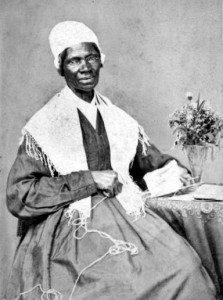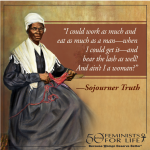 At nine, Sojourner Truth (Isabella “Bell” Baumfree) (ca. 1797-1883) was auctioned off with a flock of sheep for $100. She grew up under the watchful eyes and cruel whips of various “masters”; in 1815 a fellow slave was beaten to death for courting her. Truth eventually married, bore five children, and in 1826, escaped to freedom with her newborn daughter. When her son, only five, was illegally enslaved, she sued for his recovery and became the first black woman to win such a case against a white man. In 1829 Truth embraced Christian Evangelism (later Methodism, later Adventism), preaching widely on abolition and women’s rights. In the early 1850s, her words appeared in the Anti-Slavery Bugle, and she won influential friends like Lucretia Mott and Susan B. Anthony. During the Civil War, Truth recruited black troops for the Union, meeting President Lincoln; at war’s end, she tried unsuccessfully to secure federal land grants for former slaves. In 1872, after a meeting with President Grant, Truth attempted to vote, but was barred from the polls.Once asked if she were a man, the tall, stately Truth showed her breasts, and delivered her famous refrain, “Ain’t I a Woman?” first uttered in 1851.
At nine, Sojourner Truth (Isabella “Bell” Baumfree) (ca. 1797-1883) was auctioned off with a flock of sheep for $100. She grew up under the watchful eyes and cruel whips of various “masters”; in 1815 a fellow slave was beaten to death for courting her. Truth eventually married, bore five children, and in 1826, escaped to freedom with her newborn daughter. When her son, only five, was illegally enslaved, she sued for his recovery and became the first black woman to win such a case against a white man. In 1829 Truth embraced Christian Evangelism (later Methodism, later Adventism), preaching widely on abolition and women’s rights. In the early 1850s, her words appeared in the Anti-Slavery Bugle, and she won influential friends like Lucretia Mott and Susan B. Anthony. During the Civil War, Truth recruited black troops for the Union, meeting President Lincoln; at war’s end, she tried unsuccessfully to secure federal land grants for former slaves. In 1872, after a meeting with President Grant, Truth attempted to vote, but was barred from the polls.Once asked if she were a man, the tall, stately Truth showed her breasts, and delivered her famous refrain, “Ain’t I a Woman?” first uttered in 1851.
“Nobody ever helps me into carriages, or over mud-puddles, or gives me any best place! And ain’t I a woman? Look at me! Look at my arm! I have ploughed and planted, and gathered into barns, and no man could head me! And ain’t I a woman? I could work as much and eat as much as a man—when I could get it— and bear the lash as well! And ain’t I a woman? I have … seen most all [my children] sold off to slavery, and when I cried out with my mother’s grief, none but Jesus heard me! And ain’t I a woman? …
“What’s [intellect] got to do with women’s rights or negroes’ rights? If my cup won’t hold but a pint, and yours holds a quart, wouldn’t you be mean not to let me have my little half measure full? … If the first woman God ever made was strong enough to turn the world upside down all alone, these women together ought to be able to turn it back , and get it right side up again! And now they is asking to do it, the men better let them …”
—From “Ain’t I a Woman?” Ohio Women’s Rights
Convention, May 29, 1851
Reprinted from The American Feminist, Fall / Winter 2014






